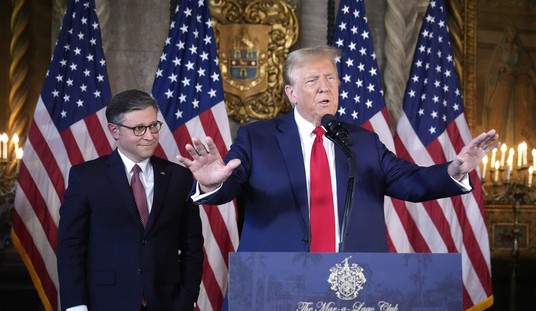While many Republicans who are facing incumbent Democrats are having to face hysterical, panicked, and wildly inaccurate attacks on their records on issues that virtually no one cares about, Scott Walker has the luxury of having faced his electorate not once but twice, and running on a proven record of achievement. The end result is that even though Walker is running in a blue state, he has forced the conversation about his re-election back onto his turf, to the point that his opponent is even unwilling to attack Walker on Act 10, which led to the attempt to recall Walker in the first place. Walker’s opponent, Mary Burke, is trying to beat Walker by, well, out-Walkering him:
Burke has surprised some observers by not emphasizing Act 10, the Walker-backed law that led to the recall push. Frequent sightings of bumper stickers with “Recall Walker” or “Stand with Walker” are a legacy of the political battles over the issue.
Burke says she supports having public-sector workers contribute more to pensions and healthcare, while arguing they should retain collective bargaining rights. Yet she does not emphasize the issue in her stump speech and explains she wants to move Wisconsin past it.
“There were a lot of people who did not feel that there had to be the divisiveness that tore our state apart,” Burke said recently after touring a business center in the river city of La Crosse. “It became political and that’s not in the best interests of the people of Wisconsin.”
A former executive at Trek Bicycle, which her father founded, Burke declares herself a fiscal conservative. But she also takes stances – in favor of raising the minimum wage, overturning Walker’s decision to refuse federal dollars for the expansion of Medicaid and opposing cuts to education – that make her popular with the Democratic rank-and-file.
As dire as the prospects look for Democrats in the U.S. Senate and House of Representatives, they look even worse at the state level. Republicans are favored to pick up a net +1 in the governor’s mansion race despite Corbett’s flameout in Pennsylvania and Brownback’s tougher-than-expected fight in Kansas. Republicans are also in position to take control of an additional 6 state legislative chambers this year which means overall that they will control over 60% of the Governor’s mansions AND state legislative chambers in the country. They may well end up with total control (Governor’s mansion + both state legislative chambers) in a full 25 states – that is, half the country.
The reason for this is that, largely, all the State battles are being fought on Scott Walker’s turf this year. Even where Obama’s unpopularity would not be expected to weigh down state legislators, voters in state after state are staring down fiscal crises and realizing that dramatic fiscal reforms like Walker’s are needed. As corporations continue their headlong flight from blue states into red ones, more and more voters have come to recognize that at the state level, liberal policies are not on the menu.
Whether Walker himself wins or loses in November, the undisputed success of Act 10 has changed the electoral and policy landscape at the state level, which will have far reaching consequences at the federal level as well. As the New York Times notes:
Republicans are looking to take over senates in Colorado, Iowa, Oregon, Maine and Nevada, and houses in Kentucky, New Hampshire and West Virginia. Republicans could emerge with complete control of the legislatures in New Hampshire and Kentucky, though both of those states have Democratic governors.
They hope these victories will help them push through legislation that has been stymied by Democrats until now, such as pressing the kind of restrictions on labor organizing the party passed in Wisconsin, or rolling back gun laws in Colorado. In Iowa, Republicans are looking to eliminate a tax on manufacturing and enact a ban there on telemedicine abortions, where women in rural areas obtain abortion pills after videoconference consultations with faraway doctors.
Matt Walter, president of the Republican State Leadership Committee, which is spearheading the statehouse efforts, said, “The pattern is crystal-clear at this point, and Wisconsin is the best example of it: That ability to drive your agenda when you are completely in control of state government will absolutely continue to play out.”
At the State level, the Democrats have completely lost the ability to play on their turf. As this results in the diminishment of their policy laboratories and Federal farm team, we can hope that this will soon have a trickle up effect at the Federal level as well.














Join the conversation as a VIP Member